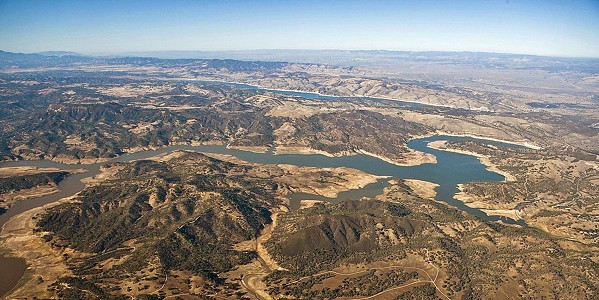The Shandon-San Juan Water District—an agricultural water district in North County—violated state public meeting laws earlier this year when it met privately in closed session to discuss and make decisions about applying for new water rights in Lake Nacimiento and Santa Margarita Lake, according to the San Luis Obispo County District Attorney's Office.
In a "cease and desist" letter sent to the district on Nov. 4, the DA's Office wrote that the district's board of directors should have discussed those issues in open session as required by the Ralph M. Brown Act, and it asked that the district respond in writing with "an unconditional commitment to 'cease, desist from, and not repeat the prior action'" to avoid a "civil enforcement action."

- File Photo Courtesy Of SLO County
- IN HOT WATER A North County water district is accused of violating the Brown Act for meeting in closed session to discuss its applications for water rights in Lake Nacimiento (pictured) and Santa Margarita Lake.
"It has come to the attention of this office that on March 16, 2021, the board of directors of the Shandon-San Juan Water District violated the Brown Act by going into a closed meeting to discuss matters that should have occurred in open session," the DA's letter read. "[The Brown Act requires] that the entire deliberative process by legislative bodies, including discussion, debate, and the acquisition of information, be open and available for public scrutiny."
In February, the Shandon-San Juan Water District filed two applications with the California Department of Water Resources for rights to up to 14,000 acre-feet of water per year from Lake Nacimiento and Santa Margarita Lake.
In its applications, which are still pending with the state, the district proposed to pipe winter overflow waters into the Paso Robles Groundwater Basin for the benefit of its roughly 70 landowners covering more than 100,000 acres of mostly vineyards.
According to the DA's Office, the water district went into closed session on six occasions between Jan. 5 and March 16 to discuss one matter of "potential litigation." Those discussions, according to the DA, were most likely about the reservoir applications and, per the Brown Act, should have taken place in public view.
Minutes from the March 16 closed session meeting disclosed that the district had applied for the reservoir water and had authorized district President Willy Cunha to enter into a related agreement with the Nacimiento Regional Water Management Advisory Committee. The DA's Office said that those discussions did not legitimately fall under the umbrella of "pending litigation."
"These are clearly matters that fall within the 'subject matter jurisdiction' of your board ... and include taking steps toward establishing water rights," the letter read. "Any discussion about these matters by a majority of the board—even if a decision [was] not made—should have occurred in open session. The minutes do not offer any information to justify the 'pending litigation' exception."
The DA's Office also said that the district appeared to intentionally keep the news about the applications under wraps "for the sole purpose of preventing others from learning" about it—citing a statement from district board member Steve Sinton at a June meeting of the SLO County Water Resources Advisory Committee.
"Our district decided to go ahead and apply for the water," Sinton is quoted as saying at the meeting. "Since this would be an appropriative water right, and under appropriative water right first in time has the highest priority, it probably is obvious to everyone why we couldn't discuss our plans and thoughts with anyone else until we had the application in place. If we had discussed it prematurely, there wouldn't have been any water to apply for."
In response to the Brown Act allegations, Shandon-San Juan Water District board member Matt Turrentine told New Times that the board plans to discuss it at its next meeting.
"We were surprised by the DA's letter," Turrentine said via email. "The board has not yet had a chance to meet to discuss this matter. We will be responding to the DA." Δ
Comments